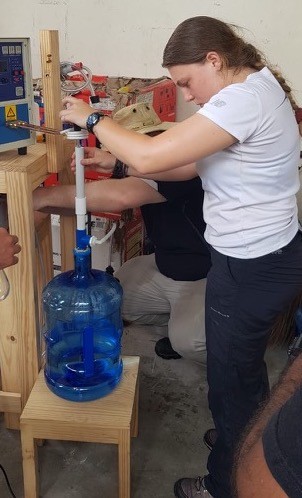A team of researchers involved in Mercer University’s Mercer On Mission program recently received the Gold Award and top prize of $200,000 in the Artisanal Mining Grand Challenge.
The global competition, which received applications from 42 different countries, recognizes innovative solutions for transforming artisanal and small-scale gold mining (ASGM) for water and biodiversity conservation.

The Gold Award-winning application, titled “Mercury Capture Systems for ASGM Gold Shops,” details a system developed by the Mercer-led team to remove dangerous elemental mercury vapor emitted in the air during the final stages of gold extraction and at the initial stages of gold refinement.
“What an amazing experience,” said Dr. Adam Kiefer, Distinguished University Professor of Chemistry at Mercer. “We have been working on the Mercury Capture System for almost 10 years, and to have others see the potential of our invention and acknowledge its promise towards a cleaner future for ASGM is a true honor.”
ASGM is a critical source of livelihood for an estimated 40-plus million people worldwide. While this type of mining generates wealth in developing countries, its practices can cause habitat loss, species’ population decline, poor water quality, hydrological changes, and negative human health and livelihood impacts. Mining is among the most significant drivers of deforestation in the world’s tropical forests, a leading cause of global biodiversity loss. In addition, ASGM in the developing world is the largest source of man-made atmospheric mercury contamination, which can have devastating consequences for those impacted by the contamination.
Dr. Kiefer has led Mercer On Mission initiatives in Mozambique, Ecuador, Peru and Guyana to develop and implement methods for reducing mercury pollution and poisoning among artisanal gold miners. His laboratory at Mercer is one of few in the world dedicated to developing solutions to this global health crisis. Teams of his students have developed analytical techniques using portable atomic absorption spectrometers and GPS units to map cities and identify the locations of excessive mercury pollution in the atmosphere.
Continue reading about the award-winning project at news.mercer.edu.









